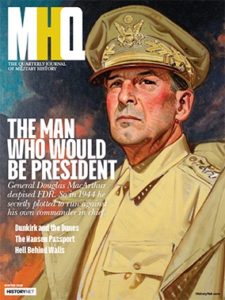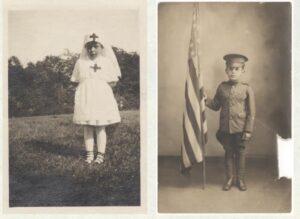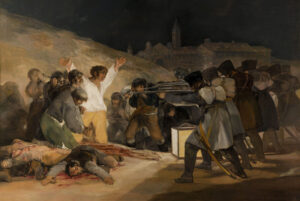As a journalist, William G. Shepherd had a knack for being in—or getting to—the right place at the right time. On the afternoon of March 25, 1911, for example, he was walking through Washington Square in lower Manhattan when he noticed smoke pouring from a 10-story building. He raced to the building, reaching it even before the fire department arrived, and in minutes was dictating, to his editor at United Press, the tragic details of the Triangle Shirtwaist Factory fire—the deadliest industrial disaster in the history of New York City. “I learned a new sound—a more horrible sound than description can picture,” Shepherd reported.“It was the thud of a speeding, living body on a stone sidewalk.” Nearly 150 garment workers died from fire, smoke inhalation, or falling or jumping to their deaths, and Shepherd was the only journalist able to provide an eyewitness account of the tragedy.
Shepherd, who was born in Springfield, Ohio, moved to Minnesota in 1898 to begin his newspaper career with the St. Paul Dispatch. In 1908 Shepherd moved to New York City, where he wrote fiction pieces for Munsey’s Magazine before signing on as a reporter for United Press. Shepherd made his mark as a war correspondent in 1911 by covering the Mexican Revolution, and the following year he went to Europe, where he covered, among other things, the 1912 Summer Olympic Games in Stockholm. He went back to Mexico in 1914 to report on the downfall of President Victoriano Huerta but quickly returned to Europe to cover World War I for Collier’s, Harper’s Magazine, and other publications. He was the first American reporter allowed at the British front in France and the only journalist who saw the Second Battle of Ypres. At one point the British arrested him for trying, as he put it, to “get out and see things.”
After the war Shepherd went to Moscow to cover the Russian Revolution, and in 1924 he became a staff writer for Collier’s magazine, producing stories on everything from dietetics and prohibition to prisons and sweatshops.
Shepherd died in 1933 in Washington, D.C., at age 55.
When Shepherd was once asked about his gift for storytelling, he replied: “It’s simple. I just write for the milkman in Omaha.” Shepherd even kept the Omaha milkman in mind as he wrote from the battlefield. “I avoided the fashion of the old-time war correspondents who criticized and analyzed as dramatic critics do at a first night,” he wrote. “I could only tell what I had seen, heard, and smelled that day.”
Shepherd did just that from Antwerp, Belgium, on September 2, 1914, when the Germans mounted a second Zeppelin attack on the fortified city. Here is the story he filed.
ANTWERP, Sept. 17. (By mail to New York.)—Before this war, experts used to say perfection of terrible instruments of killing would only tend to make war impossible. It doesn’t do that, though. I watched the Zeppelin dropping bombs upon Antwerp last night, and such perfection only makes war more terrible, with a refinement of barbarism. As I saw the Zeppelin depart it seemed that the best argument against war was that it turned men into such merciless demons as these Zeppelin murderers.
The wildest flights of imagination couldn’t approach what happened in Antwerp twelve hours ago. Early in the evening a Belgian captain took me the rounds of his company stationed in the center of the city. His men were divided into small squads in a dozen streets. They were sitting on the sidewalks with their backs against the building walls, drinking hot coffee, which had been brought to them in an automobile. It seemed that his men were pretty well spread out in case of an attack by the Germans, but the captain said there were 30,000 soldiers scattered over the city in the same way. Later the reason was apparent.
Not until 1 o’clock in the morning did the big red harvest moon begin to sink. It left the streets in pitch darkness. The city was so tranquil and still that the crackle of the dry autumn leaves which had fallen from the elms in the public square seemed to be noise. It was chilly, too, and the soldiers on the sidewalks were wrapped up in their big overcoats, and too drowsy or too comfortable to challenge.
An hour and a half later I was awakened by soldiers talking excitedly in the street beneath my window. But above the sound of their voices was another noise, a terrific whirring, high in the air. I jumped from bed, rushed to the window and looked upward. There was a terrific explosion, far away, a deep booming roar. A moment later a spark came whirling and circling through the air like a shooting star gone mad. It sank into the skyline of roofs and another explosion boomed out.
And then up against the stars I saw the Zeppelin, perhaps a mile high and out over the outskirts of the town.
There is a sickening feeling of utter helplessness in witnessing such a sight and mingled with this feeling is a fascination in the thought that such a thing is not superhuman. Up there in the sky are human beings, working, carrying out orders, watching maps of the city, tracing streets, pulling levers, adjusting machinery, turning steering wheels and lighting fuses of bombs, that are intended to kill men, women and children.
I remember what a great Belgian statesman had said that afternoon: “You know, only two Christmases ago Emperor William of Germany and King Albert of Belgium spent part of the holiday season together. King Albert’s baby daughter loved the emperor so much because he played with her that she cried to get on his lap and was disconsolate when the visit was ended. How can he order his Zeppelins now to drop bombs on these houses, perhaps on the very house where the little girl and her mother and father and sisters and brothers are sleeping, is more than I can understand.”
Another spark fell and there was a third explosion. Then a new sound filled the air. It began far away. It was the rattle of rifles—thousands of them. The firing grew nearer and louder. There were sharp orders. Under my window the soldiers began to shoot, the flashes lighting my room. They held their rifles straight upward. The sound grew louder and louder. Within a minute the din was indescribable.
Thirty thousand soldiers were shooting, each as fast as he could fire with his magazine rifle. The orders were not to try to hit the Zeppelin until it was overhead. Every man’s duty was to shoot straight up.
They were filling the air with steel. They were putting up a fence of metal a mile high around the city and palace. They filled the air with death to anything that entered the zone above Antwerp. The big guns in the forts around the city began to boom. Aeroplane machine guns mounted on automobiles dashed about the streets, adding their burring, rattling sound to the din. It was a million Fourth of July celebrations rolled into one.
In the midst of it all there were eight more of the big bass booms, the voice of the Zeppelin bombs, in quick succession. To the last, in the midst of the bullets and superhuman confusion, the supermen in the Zeppelin had tried to stick to the job. Two of the eight bombs fell within twenty and thirty meters of the Red Cross hospitals; the other six beat a Gargantuan tattoo on the field around the wireless station, which the airmen were evidently trying to destroy. The holes in the earth about the station were each the size and shape of a cistern.
Ten minutes of firing had made the Antwerp sky unhealthful.
As the last batch of bombs went over the sides of the car the balloon arose and sped away from the city.
The firing died out slowly. Half an hour later the Zeppelin was reported at a point 12 miles away. Two children, three women and five men had been injured—though none seriously—and three houses destroyed. Nearly all the terrified families of the city had taken refuge in the cellars, for a week before the same Zeppelin had bombarded the town and killed several persons. The bullets fired by the soldiers came falling from the sky, but aside from breaking skylights they caused no injuries. Folks going to work this morning picked them up for souvenirs. MHQ
[hr]
This article appears in the Winter 2019 issue (Vol. 31, No. 2) of MHQ—The Quarterly Journal of Military History with the headline: Terror in the Sky

Want to have the lavishly illustrated, premium-quality print edition of MHQ delivered directly to you four times a year? Subscribe now at special savings!





